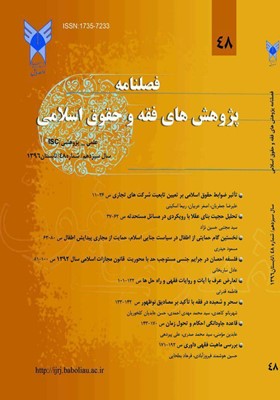نخستین گام حمایتی از اطفال در سیاست جنایی اسلام، حمایت از مجاری پیدایش اطفال
محورهای موضوعی : حقوق خصوصی
1 - استادیار واحد خوراسگان، اصفهان، ایران
کلید واژه: سیاست جنایی, حمایت, طفل, سیاست جنایی اسلام,
چکیده مقاله :
سیاست جنایی اسلام در قبال اطفال صرفاً در سیاست کیفری خلاصه نمی شود. تنظیم نحوه ی واکنش کیفری در قبال ارتکاب جرم (بزه کاری) و حمایت از ایشان در مقابل جرایم (بزه دیدگی) جزئی از سیاست جنایی اسلام در حمایت از کودکان است. سیاست جنایی اسلام در بحث حمایت از اطفال علاوه بر مقوله های مذکور به ابعاد دیگری نیز توجه دارد. در سیاست جنایی اسلام دایره ی وضع قواعد حمایتی به دوران قبل از شکل گیری کودک یعنی از زمانی که خانواده ای در حال تشکیل است بر می گردد. در این قسمت اسلام با وضع قاعده در سه زمینه ی کلی سعی بر حمایت از اطفال داشته است. سوق دادن میل جنسی و به تبع آن ازدیاد نسل در قالب عقد نکاح شرعی، وضع قاعده در رابطه با فرایند انتخاب همسر و همچنین ایجاد تکلیف برای والدین بالقوه برای آمادگی همه جانبه جهت فرزندآوری از اموری هستند که بحث حمایت از اطفال را در نظر داشته اند. به نظر می رسد در برخی از این زمینه ها، مثل بحث نکاح و شرایط همسران، هدف حمایتی در کنار اهداف دیگر در وهله ی دوم اهمیت قرار داشته است. در حالی که در جایی دیگر، مثل توصیه های لازم برای فرزندداری، هدف اصلی از وضع قواعد معطوف به حمایت از اطفال می باشد.
Islamic and criminal law regarding the children is not merely briefed in the panel policies. Regulating the response of manner against misdemeanor is a part of the Islamic criminal code. In Islamic criminal policy, in addition to this issue other dimensions are of concern as well. This section in Islamic criminal law involves the period of the child’s formation, that is, when the family structure is being established. Here, the child is protected by the law with respect to the three general concepts: promoting the idea of sexual desire towards regeneration by observing the law regarding marriage, regulated selection of spouse and educating and preparing the ground for the healthy family structure. It seems that in some aspects like the issue of marriage, the objective of support is rated based on the secondary comparison to the other aspects.
25. میرزا قمی، أبوالقاسم بن محمدحسن، (1376)، غنائم الایام فی مسائل الحلال والحرام، مکتب الاعلام الاسلامی، قم.
_||_
. Aljaziri, A. (No date). Alfiqh Al-Mazaheb Al-Arbae. Beirut. Beirut.
2. Allame Helli, A. (2000). Regulations of law. Qom: Islamic Propaganda office.
3. Ameli, H. (1995). Vasaelol Shiah. Tehran: Islamieh Publication.
4. Ansari, G. (2013). Children’s right according to Islamic right. Tehran: Didar Publication.
5. Bokhari, M. (1986). Sahihol Bokari. Beirut: Darol Raedol Arabi.
6. Delmas, M. (2006). The great orders of criminal policies. Tehran: Mizan Publication.
7. Fazel Esfahani, M. (1992). Kashfol Lesam Mojaladel Sani. Qom: Qom Publication.
8. Golpayegani, M. (2004). Alhedayat Ela Man Lahol Velah. Qom: Elmieh Publication.
9. Hassan, A. (1997). Tohafol Oghul. Tehran: Darol Kotobel Islamieh Publication.
10. Hosseini, S. (2004). Criminal policy in Islamic Republic of Iran. Tehran: Tehran University Publication.
11. Hosseinizadeh, A. (2002). Ordered biography of the profit and dynasty in child training. Tehran: Nashr Nou Publication.
12. Jafarpour, J. (No date). The illegitimate children right and Islamic law. Tehran: Matin Magazine.
13. Lazrej, C. (2003). A prelude on criminal policy. Tehran: Mizan Publication.
14. Majlesi, H. (2007). Beharol Anvar. Tehran: Islamieh Publication.
15. Makarem Shirazi, N. (1995). Sample description. Tehran: Darol Maktabol Islamieh Publication.
16. Mirza Qomi, A. (1997). Ghanaemol Ayam Fi Masaelol Haram Val Haram. Qom: Maktabol Alamol Islami.
17. Modaresi, M. (2002). The high values of creation and comparative philosophy in law. Tehran: Ferdous Publication.
18. Mohaghegh Helli, A. (2009). Sharayeol Islam. Tehran: Islamieh Publication.
19. Mohammadian, B. (1996). A view of children's rights in Islamic perspective. Tehran: Khorsandi Publication.
20. Sheikh Tousi, A. (2001). Purification of law. Tehran: Darol Kotob Islamieh Publication.
21. Vaziri, M. (2002). A view on father’s duty about the child. Tehran: Tehran University Publication.
22. Veisi, A. (2012). Ascribing the natural newborns to the parents in Imamiyeh jurisprudence and related codes in Iran’s jurisprudence and Islamic codes Periodic.


